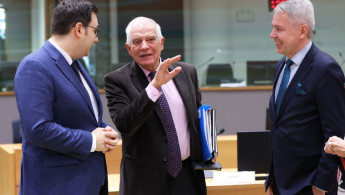EU discusses further sanctions on Russia and Iran and sending funds to Ukrainian armoury
European Union foreign ministers will try to agree on further sanctions on Russia and Iran and an additional 2 billion euros ($2.11 billion) for arms deliveries to Ukraine at a meeting in Brussels on Monday.
However, it remained unclear whether Hungary will block some decisions, resorting to what diplomats have denounced as "blackmail diplomacy" due to a dispute over locked EU funds for Budapest.
"There is agreement, in principle, but there's also the big elephant in the room," a senior EU diplomat told reporters, referring to Budapest's use of its veto power. "It's a type of blackmail diplomacy that we would rather not see but it is what it is."
Foreign ministers are due to review new sanctions on Iranian people and organisations over human rights abuses in Tehran's crackdown on protesters and the supply of drones to Russia.
"We are going to approve a very tough package of sanctions", EU foreign policy chief Josep Borrell said ahead of the meeting. The EU "will take any action we can to support young women and peaceful demonstrators."
German Foreign Minister Annalena Baerbock said the sanctions would target Iran's Revolutionary Guards, among others.
"With this sanctions package, we are targeting in particular those who are responsible for the executions, the violence against innocent people...these are especially the Revolutionary Guards," she told reporters in Brussels.
Baerbock spoke after Tehran executed a second man involved in anti-government protests following calls by the Revolutionary Guards for Iran's judiciary to act swiftly and decisively.
EU foreign ministers will also discuss a ninth package of Russia sanctions that is set to place almost 200 more individuals and entities on the EU sanctions list, but Borrell stressed there was still no agreement on this at this stage. He hoped that could come later on Monday or on Tuesday.
Ministers will also aim to top up by 2 billion euros a fund member states have used to finance arms purchases for Kyiv, but which has been largely depleted over almost 10 months of the invasion of Ukraine.
Ministers are expected to agree on a civilian mission to Moldova, which may ask for help in cyber defence, the fight against corruption or the strengthening of the rule of law.
Foreign ministers are also expected to pave the way for a three-year military mission to Niger, with 50-100 troops at first and later up to 300 to help the country improve their logistics and infrastructure.
One of the poorest countries in the world, Niger is seen at risk from a possible spillover of violence from neighbouring Mali, where Islamist militants are gaining ground following the withdrawal of French and other European forces.
Before their meeting, ministers will talk with their counterparts from the Eastern Partnership - Armenia, Azerbaijan, Georgia, Moldova and Ukraine - nations the EU has sought to stabilise in the face of Russia's war in Ukraine.





 Follow the Middle East's top stories in English at The New Arab on Google News
Follow the Middle East's top stories in English at The New Arab on Google News

![MP Essam Diab's pursuit to block TikTok in Egypt has revived an already ongoing debate in the country. [Getty]](/sites/default/files/styles/image_330x185/public/1230748046.jpeg?h=a5f2f23a&itok=-8MqBLLC)
